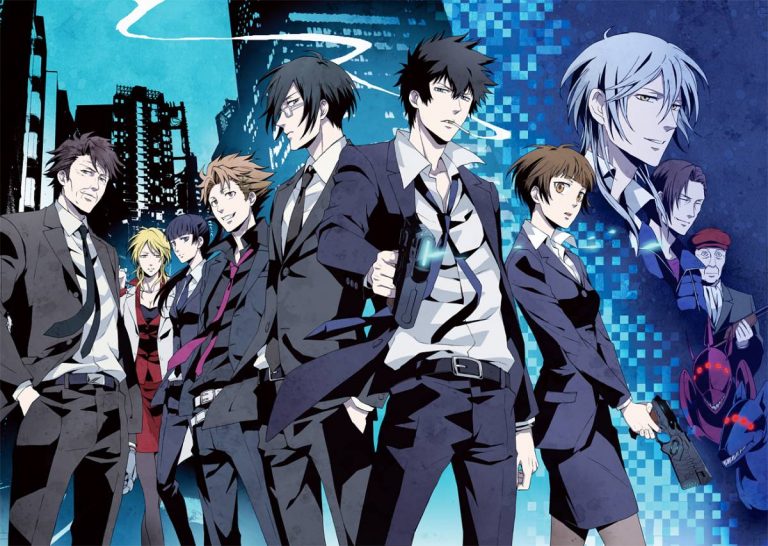We’ve all been there, browsing on Netflix but not entirely sure of what to watch. I’d blitzed through nine seasons of It’s Always Sunny in Philadelphia and I want to take my time with Breaking Bad, so I needed something different. I needed to expand my horizons. So I opted to make a start on some anime, but first I had to get over some stigmas. Namely, the whole tentacle porn thing. Still though, I know people who love anime so I thought I’d go for it. Maybe it’ll influence my own writing or maybe it’ll just be a casual thing, so I opted to start with Psycho-Pass.
Psycho-Pass is a sci-fi detective drama hybrid set in a futuristic version of Japan where the country is governed by an entity called the Sybil-System. This is a dystopian world where your future is pre-determined and you can be deemed a criminal and locked away at a young age, based on how high your psycho-pass is. It feels very totalitarian, and Enforcers have permission to shoot you dead if your crime coefficient is too high and the System deems you to be too dangerous for society. Just thinking bad thoughts can get you killed in this world.
The main character is a young woman named Akane Tsunemori who is a rookie Inspector and has just been appointed to handle Enforcers. Enforcers are essentially Inspectors with a high psycho-pass, meaning that they have the skill set and the aptitude but are deemed dangerous and are therefore expendable. In the show they are described as “hunting dogs” and the Inspectors are the ones holding the leash.
At first Akane is very unsure of her ability and her intelligence, she scored very high on all of her tests which enabled her to “choose” her career path, but she is constantly treading on eggshells and wondering whether she is really cut out for the job. Her apprehension isn’t helped by her enforcer colleague, Shinya Kogami. Kogami is a brooding, vengeful yet very intelligent character, and she seems to spend more time figuring out who/what makes Kogami tick rather than stick to her own convictions, which in the theme of the show is quite refreshing to see an Inspector actively try to learn from an Enforcer rather than treat them like rabid animals.
The series does a good job of making the characters believable and even likeable, such as villain Shogo Makishima, as you see their personalities and how it influences their methods (and at times, madness). You don’t have to agree with the way Makishima does things, but you see and, to an extent, admire his charisma, intelligence and conviction. When he is on screen you know that someone is going to be put in danger, and there’s not a damn thing that you or anyone can do to stop him.
This makes for an interesting relationship between Makishima, Kogami and Akane with both villain and Enforcer influencing and almost moulding the young recruit in the same way that Barnes and Elias influence Chris Taylor in Platoon. Akane is special in that her psycho-pass/hue cannot be clouded, but as the influence of Kogami grows and as the intensity or Makishima’s crimes grow, you do wonder whether she’ll eventually snap and give up on her own moral code in order to bring criminals to justice.
Another thing I really enjoyed about the show was the setting and the lighting, you know straight away that this is a dystopian world because the show borrows Noir elements of darkness, the area is usually dimly lit when something goes down. For a world governed by a supposedly “perfect” System, this version of Japan is very grungy and, in more ways than one, very dark.
This makes the acts of violence more harrowing. For example, there is a scene where a woman is being beaten to death in the middle of a typically busy street, yet no-one is intervening. It all adds up to the growing realisation that the Sibyl System is very much flawed; not only is an innocent woman being murdered but no-one knows what to do to stop it, especially when the police drones just let it happen.

Psycho-Pass does take on a bit too much, narrative wise, and does feel like a bit of a grind. For about half a series we are introduced to different villains who are simply insane or have motives that are completely unrelated to the Sibyl System and it’s up to Akane and the PSB (Public Safety Bureau) to solve these murders. We’ve probably already seen a number of detective shows that follow this same trait, so Psycho-Pass is nothing special in that regard, it is at times just another cop show.
Entertaining? Yes. Ground-breaking? Hardly.
Philosophy is an integral part of the narrative, which I found interesting and is largely what kept me watching, but that is because I know even less about philosophy than I do Anime. It’s an interesting idea, but one that is rather dragged out by the quoting of texts and plays that just makes the show seem ridiculous, and it takes away from the intensity of the message that the show is trying to say. Psycho-Pass almost tries TOO hard to look like an intelligent show in this regard and it’s because of this that the philosophy becomes a filler for episodes.
Personally, I think episodes exploring what the Sybil System’s pre-determination of criminal tendencies means for the wider scope of this Japan in terms of education, immigration, economy etc would have been a better way to fill some of the episodes. Some of them are alluded to, but I think that exploring these in further detail would serve the show’s dystopia and social commentary a lot more justice than having long monologues from the characters.
I would also have liked to have seen further development of the character of Shion Karanomori, who is an analyst at the PSB. For someone who plays a key role in the solving of cases, we don’t really know a lot about her and at times I felt that she was simply there for eye candy. She has an alluring attitude but is a latent criminal, and this could have been explored more like the show does with the other Inspectors and Enforcers, but it’s too easy to see her as the blonde lesbian who shows cleavage.
The initial sexual tension can be amusing, but I think the show could have added more social commentary with this character. Whilst I appreciate that Psycho-Pass seems to normalise same sex relationships, it did interest me what being gay is like in a world run by the Sibyl System. I think that Psycho-Pass generally does a great job with character development, but it really shunned a key component of the team.
All in all, Psycho-Pass is a pretty solid show and a good place to start if you’ve never watched Anime, but it could and probably should be a lot better. For all the philosophy and the brutality, I can’t shake the feeling that it has so much more to offer but fails to deliver and ultimately becomes “just another cop show”. Still, I did thoroughly enjoy it and would recommend it to anyone.
And the best thing about Psycho-Pass? Not a single tentacle in sight.
Some of the coverage you find on Cultured Vultures contains affiliate links, which provide us with small commissions based on purchases made from visiting our site.

